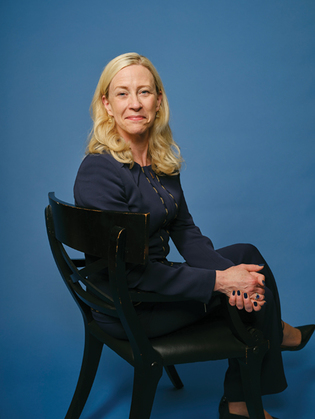
Chris Buck
The Yale Alumni Magazine publishes a short interview with President Maurie McInnis ’96PhD in every issue. In this one, the president talks about Yale’s investments in quantum research and technology with editor Pippa Jack.
View full image
YAM: Quantum computing isn’t easy to grasp. Can you give readers a lay explanation?
MM: (Laughs) Well, I can give you an art historian’s attempt: Take the twentieth century’s defining discovery, quantum mechanics, and combine it with its defining invention, the computer. If you think of quantum mechanics as the promise of the smallest things—quanta—quantum physics studies them to identify key phenomena like superposition and entanglement. Though it’s focused on the invisible, the innovation it’s produced is very visible, like smart phones and GPS. And quantum computing’s processing capabilities go beyond the binary terms that conventional processing uses, making computing exponentially faster and more secure. It’s a complete paradigm shift.
YAM: Yale was in the news when QuantumCT was named a finalist for a National Science Foundation grant. What’s that about?
MM: QuantumCT is a public/private partnership that brings together Yale and the University of Connecticut, along with the state and federal government, companies, and private investment. The idea is to build a quantum technology economy in Connecticut. How can we make the state more attractive to start-ups? How can we create a quantum workforce? How do we encourage existing companies to adopt quantum technologies and new companies to turn theory into practical applications? Quantum technologies could generate devices that exceed GPS’s accuracy, or allow us to dramatically speed up the development of new drugs to treat disease. With the right infrastructure, maybe it all grows right here in Connecticut—maybe we become quantum’s Silicon Valley. So we are working on securing this very large grant: a total maximum award of $160 million over 10 years. We took a big step forward in September when Governor Ned Lamont [’80MBA] announced a $50.5 million investment in the New Haven quantum and life science innovation ecosystem. We are leaning into these partnerships to ensure Yale, our state, our region, and our nation are at the forefront of the field.
YAM: Professor Emeritus of Applied Physics Michel H. Devoret just won a Nobel for his work in quantum physics, and Yale continues to attract top-notch faculty. Tell us about some of these new researchers.
MM: One of the most important things we do here is recruit the very best faculty and give them the support they need to be successful, including a community of researchers with whom they want to work. We’ve also doubled down on investing in cutting-edge science infrastructure, like the Yale Quantum Institute and the Physical Sciences and Engineering Building currently under construction on Science Hill. Take Michael Hatridge, an associate professor in applied physics, who builds quantum circuits that are—as he puts it—“big enough and strange enough” to push the field forward. He’s working on using microwave light to entangle larger quantum systems and expand their scale. A second is Charles D. Brown II [’19PhD], who has returned to Yale as an assistant professor of physics. He studies very, very cold atoms, and last fall, he won an NSF Faculty Early Career Development Program award, a highly prestigious five-year grant. Then there’s Yongshan Ding, assistant professor of computer science and applied physics. He literally wrote the book on quantum computing; he’s co-author of the textbook Quantum Computer Systems. He leads the Quantum Systems Lab and directs our Quantum Science and Engineering Certificate program. His work tackles errors that naturally occur in quantum computations. He also won an NSF grant last year, and in September he won the 2025 IEEE Quantum Technical Community Distinguished Early Career Award for outstanding contributions in quantum computing and engineering.
YAM: If you could use quantum computing to solve any problem, what would it be?
MM: I think about big problems in medicine. Quantum computing could dramatically accelerate drug discovery. That’s because it can do incredibly large-scale calculations to predict how different molecules interact in our bodies. It could greatly advance the benefits we are beginning to see from personalized medicine. For an individual, we might be able to figure out exactly the right medicine, the right dose, the right treatment for that person’s particular condition. That’s an area where I could imagine rapid transformation for all of us.
 loading
loading